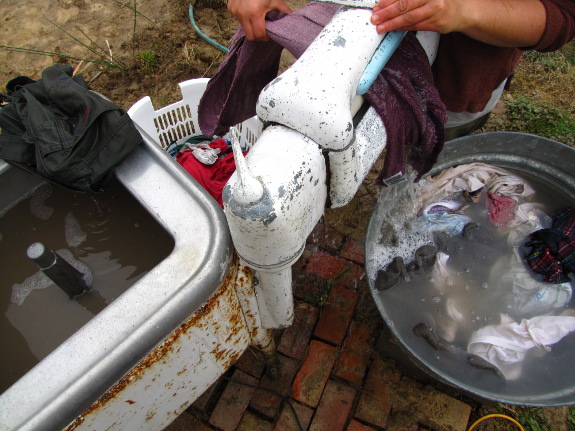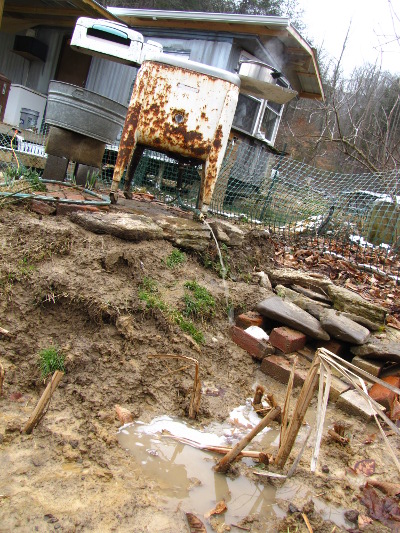
Greywater wetland's first inundation

 I've been looking forward to
laundry day so I could try out my new laundry
nook beside the greywater
wetland. And
it works like a charm!
I've been looking forward to
laundry day so I could try out my new laundry
nook beside the greywater
wetland. And
it works like a charm!
I actually thought I
might need to add rocks to the slope between the laundry nook and the
wetland to prevent erosion, but the water gushes out with such force it
ends up right where I want it.
Dishwater hasn't been
enough to wet more than the entrance to the wetland, but the washer
dumps enough water to inundate the whole depressed area. Not so
much it runs into the pond, though, which is a good
thing.
So far, all the
greywater wetland does is prevent excess water from souping up the
yard. I keep planting things in the wetland and around the edges,
though, so in a few months hopefully leaves will pop out and the whole
ecosystem will come together.
Want more in-depth information? Browse through our books.
Or explore more posts by date or by subject.
About us: Anna Hess and Mark Hamilton spent over a decade living self-sufficiently in the mountains of Virginia before moving north to start over from scratch in the foothills of Ohio. They've experimented with permaculture, no-till gardening, trailersteading, home-based microbusinesses and much more, writing about their adventures in both blogs and books.
Want to be notified when new comments are posted on this page? Click on the RSS button after you add a comment to subscribe to the comment feed, or simply check the box beside "email replies to me" while writing your comment.

The system seems to be doing the job so far. Hopefully in time it will soak in and create a thriving wet land environment.
Do you think you will have a drying out problem this summer? Or do you hope to have enough plant life to keep the area shaded and damp?
Mona --- That's one of the big questions --- will any wetland plants survive over the summer? We haven't hooked the gutters into the wetland yet in part because I'm afraid it'll be too much water for the winter, but that might help with drying out in the summer. Or maybe we'll end up channeling the gutters into one of our big tanks and then releasing a bit at a time into the wetland during droughts. Probably the wetland will at least partially gley itself, so will start holding more water, and I am planting around it. But I really don't know.... Many exciting permutations to consider!
Ed --- My main reason for the wringer washer is that you can keep it outside because the water completely drains out every time (versus a modern washer where you have to keep it heated or the water in the pump will freeze). In addition, a wringer washer works no matter what your water pressure is (even if that involves merely pouring in buckets of water) whereas a modern washer requires a certain amount of pressure in the line. Finally, the moving parts in a wringer washer are very minimal, so when we have problems, Mark can fix it easily. Mostly, though, the first reason is the big one, since we have such a small heated space during the winter and since I like to do as much work as possible outside. When I crunched the numbers, it was no more energy efficient than a modern washer, assuming I used the same heat or cold cycle in both. So, if you have a big house that you keep heated and prefer to work inside, a modern washer is nearly as good.
A front loader in general uses less water and energy than a top loader. It can also do the job with less detergent due to the paddles inside the drum lifting up the clothes and dropping them repeatedly.
My front-loader is now 17 years old, and has never had a problem. On average I think I use it once a week, using about 50-75 ml (3-5 tbsp) of detergent powder per cycle. I'd guess (haven't measured it yet) the water usage is between 13-20 gallons per cycle.
The best thing is that it's totaly automatic. Dirty clothes and detergent go in, clean and almost dry clothes come out. It has a 1000 rpm spin cycle, so most clothes are dry the next day even if I hang them to dry inside.
It has a 1000 rpm spin cycle, so most clothes are dry the next day even if I hang them to dry inside.
@Rebecca: have you looked if any of the european brands (from best to worst) Miele, Asko, Bosch, Siemens or Zanussi are available in the US? Check how many washes you do in a year. Miele machines are the most durable (but also the most expensive, generally). They can last around 5000 cycles. Very cheap machines won't last more than 1000-1500. You have to take that into account when looking at the price. If you have a big family and wash every day, a 1000 cycle machine won't last three years.
Mechanically front loaders are pretty simple, and there is a lot of maintenance you can do yourself, starting with using the machine correctly. But there are part repairs you can do yourself, like changing the drive belt, the brushes on the motor or the door seal.